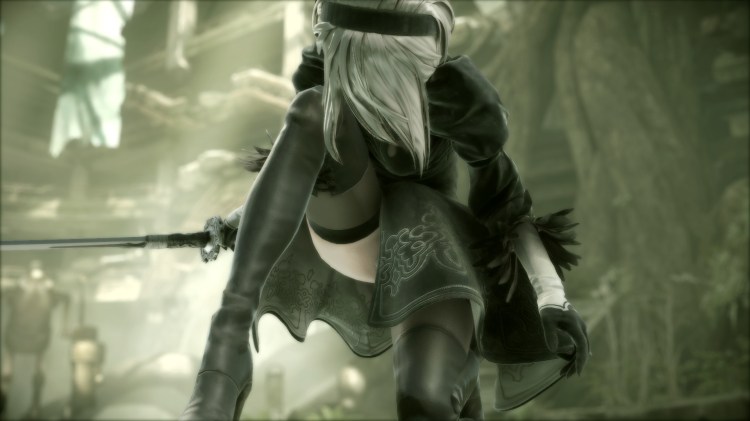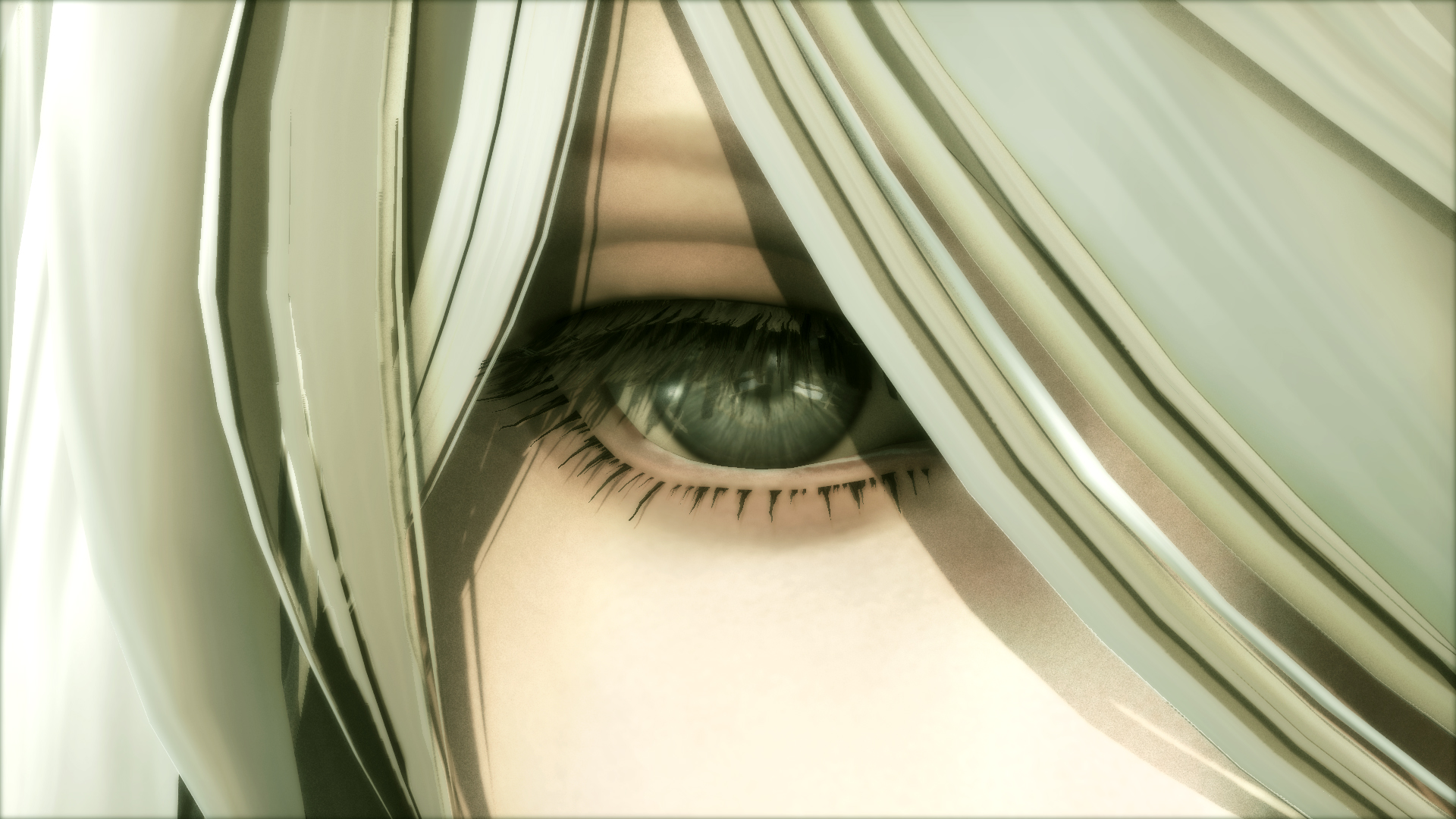Question: Can you talk about where you are in development? When did that six-month preproduction end? What’s the current status of the game?
Yosuke: About December of last year was when I was busiest. That’s around when preproduction completed. We’re about a year into development now. I’d love if we could show off more gameplay-related stuff by this fall if possible. Maybe not the Tokyo Game Show, though.
Taro: In the trailer we showed today, at the very end we used the game model. There’s just a slight blip at the end that’s pretty much from the game. We’d love to be able to show something longer and show people what we’re looking to create and deliver.
Question: Something else that made Nier unique was how you changed up the gameplay a lot. Some parts were top-down, some were set up like a platformer, and you had the third-person action. Will we see that same swapping between genres?
Yosuke: Some of that’s come up. We’re thinking about possibly doing that. But personally, I don’t like to repeat myself. I want to bring in some new things. We may do that, but not as much. It’s very much up in the air, but that’s something we are considering.
GamesBeat: I’m interested in the musical score, because that was a huge standout in Nier. A lot of people enjoy the score haven’t even played the games. I’m curious how you’re approaching that. Has work started on the soundtrack? Has music informed the game’s design in any way?
Yosuke: As far as the score, we’re starting to compose. We’ve compiled a list and we’re starting on that process. That song in the trailer is from the original Nier, called “Song from the Past,” or something along those lines. It’s something Mr. Okabe specifically composed for the occasion. He did the piano arrangement for this trailer at E3.
Taro: We cut up the score and do a lot of different things with it. I’m pretty sure that Mr. Saito will agree with me, but we don’t really know why people are so in love with it. I’m sort of sick of it. I wonder why it sold so well.
Yosuke: We’re probably a little negative because we have to listen to it all the time. But it is a big part of the game. We just try to get the music to work with the game, to get in sync with the game world and its vision. Say a certain type of enemy comes in. We’ll have a percussion part come in to attract that. Little details like that make it work with the game world.
Taro: Another example, if it’s a very sad part of the story, we’ll obviously use a somber tune. We’ll do things like that design-wise. But honestly, the fact that the soundtrack sold so well and the game didn’t, I’m very jealous of that.
Yosuke: Mr. Okabe is actually a school friend of Mr. Yoko’s. Mr. Okabe wasn’t doing so well. He was actually considering leaving the game industry as a composer at the time when we approached him for Nier. Then all of a sudden he became very popular and very famous, and he’s getting work left and right. We were telling him that it’s thanks to us that he’s so successful. He’s working on anime, TV dramas, movies, all kinds of things.
Question: I wanted to ask about the action element of the game and why you’re working with Platinum. They’re known for very fast-based, twitchy reactions in gameplay. What are you asking Platinum to do as far as how they’re developing combat?
Yosuke: The only thing I really asked of Platinum, to give you some background—as you said, Platinum is very action-oriented. They make very fast-paced action games. But because of that, people have these preconception that their games are very difficult to get into, that they’re not for everyone. With Nier we had many female fans. Part of it was because of Mr. Okabe, but also because of the characters and story and world view that Mr. Yoko created. I asked Platinum, when we decided to do this, to make an action games, but something women would be able to appreciate and enjoy. That’s the key thing I asked for.
Taro: For me, obviously Platinum is great creating action games. We asked them to make it a little more simplified, just slightly, but—at first I thought this would be a heavy battle action game. I was a little worried. But luckily for us, a lot of their staff members really respect Nier. They took it to heart and understand that project and that title. They essentially took the battle system and game design of Nier and added Platinum-type elements on top of it, to make a hybrid of a kind. But it’s not a completely new game where they deconstructed everything. They really have respect for the previous game. That made me happy.
Question: Nier and its parent series have always been very mature in tone. You’ve had incest, intersexed characters, a lot of violence, a lot of profanity. It’s very unafraid to be what it is. It seems that the industry is currently in a state where it’s a little sensitive to sexualization and violence. Do you plan on keeping the tone you’ve always had in the new game, or are you planning to change that at all?
Taro: Drakengard was my first title as a game director. We were told a lot by our board, our censorship board, to do retakes and make changes. Honestly, I was thinking, screw this, I’m not going to make another one. With Nier I wanted to make a more normal game. Of course, for me it’s a normal game. People still think it’s very dark and very somber and whatnot, but for me that’s more normal than Drakengard.
GamesBeat: Revisiting Nier, looking back at the performance of the initial release, were you hoping for a fresh start? Were there things you wanted to do? Going into this with Platinum, it feels like you’re handing off a bit of what you could have done. Would you call this a more new game, or do you want to tie it closer to the previous one?
Yosuke: For the original, it was a new IP. It was a challenge building something from the ground up. I specifically chose a character designer at that point who wasn’t that well-known. But in terms of development, we were still using the Drakengard team. So it was similar in that regard. But with this project, we really wanted to grow the brand. That was one of our main goals with this title. In order to do that, we felt that we needed to pull out all the stops. We wanted to use a well-known character designer in Mr. Yoshida. Obviously fans love Mr. Yoko’s world view and the world these characters live in, as well as the music. I specifically wanted to work with a developer who has a strong fan base because of their game designs and gameplay, who are well known for that. That’s how this discussion came about. Once we decided to all go together, it was just about trying to make that vision come true.
Taro: For me, touching on what Mr. Saito addressed already, on the new stuff we’re trying to do and maintaining some form of connection to the previous game—the way some members of the media—the way I look at the original Nier is like your mom’s home cooking. It might not be great, but it’s OK. You’re comfortable with it. Some members of the media told me that the original Nier is like a puppy someone threw out. It’s cute in a way, but there’s something wrong. You can’t help but love it. There’s something missing. It’s cute, but something there you can’t put your finger on. This time, working with Platinum, with Mr. Yoshida, with Mr. Okabe, we have these great ingredients to work with. It’s going to be too perfect. We have all these great ingredients and great chefs working together. But is it going to be missing that thing that made it so endearing to our fans? After thinking about it, we said, let’s just give it a try to see where it goes.
Question: You seem very secretive about the name. You’ve talked about how it isn’t necessarily Nier 2. Do you feel like you’d be giving too much away by announcing the title at this point?
Yosuke: As far as the subtitle, technically we could have announced it, but—the problem is, there’s a word in the subtitle that plays a vital role and would give away a good idea of the story and the concepts we have in mind. Another reason why we haven’t made the announcement is that we haven’t come to a complete agreement on what the subtitle will be. That’s why we haven’t announced that yet. Going forward we’re going to have more discussions and come to a final subtitle that we’ll eventually release.
Taro: Simply put, we just ran out of time. We didn’t come to a decision soon enough.
Yosuke: Honestly, if we really tried, we probably could have come up with a subtitle and made an announcement, but there’s a lot of planning we have to go through. We’ll take the time and hopefully come up with an announcement around the fall.
Question: Is it safe to assume that the woman we saw in the trailer is the protagonist?
Taro: We have three playable characters. She’s one of the three.
Yosuke: There’s actually another video we have with a different playable character in it. It in the trailer, if you look very closely. There’s a little boy, and he’s another one of the playable characters. He’s on the roof of a tall building.
GamesBeat: You mentioned a sense of responsibility to fans. While that makes sense, it seems strange when you’ve acknowledged that maybe the original didn’t sell well from the get-go. Is that because the fans are so vocal and dedicated? Where does that responsibility to fans come from?
Yosuke: This may seem like a pretty vanilla answer, but there are several reason. One is, in terms of my job title, I’m responsible to sell copies. That’s the nature of the business. Another is that we need to make money. In order to do that, we need to sell copies. I just spent time thinking about what we needed to do to sell better, and that’s where this all came about for me. Honestly, I’d like to ask what we need to do to get better sales. If you have any advice, I’m all ears.
VentureBeat's mission is to be a digital town square for technical decision-makers to gain knowledge about transformative enterprise technology and transact. Learn More



